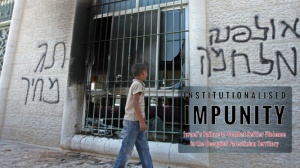Institutionalised Impunity: Israel’s Failure to Combat Settler Violence in the Occupied Palestinian Territory
Latest Topics
19، Apr 2025
Al-Haq Publishes Legal Brief Calling the European Commission to Implement the EU Blocking Statute Against United States Sanctions on the International Criminal Court
18، Apr 2025
Field Focus: Strategic Land Theft and Forced Displacement in Al-Makhrour – UNESCO Site Under Threat
16، Apr 2025
Al-Haq Condemns Israel’s Continued Territorial Reordering, Evacuation Orders and Mass Displacements in Inhumane Conditions as Acts of Genocide
11، Apr 2025
Al-Haq and Partners in Denmark Respond: "The fight for justice and accountability does not stop here."
10، Apr 2025
Open Letter to United Nations Security Council, Israel is Starving Palestinians in Gaza, Act Now to Save Gaza - Sanction and Expel Israel from United Nations
08، Apr 2025
Al-Haq Submission to the Special Rapporteur on toxics and human rights, examines Israel’s genocide and ecocide: military destruction of Palestinian life and environment in Gaza
Related Subjects
12، Oct 2019
Over 280 ESCR-Net Members Call for Stronger Treaty to Regulate Corporate Activities
09، Oct 2019
Al-Haq’s Engagement with the UN Committee on Economic, Social and Cultural Rights for Israel’s Fourth Periodic Review
08، Oct 2019
Al-Haq Welcomes Launch of World Health Organization Report on the Right to Health in the Occupied Palestinian Territory



 Third States are under an obligation to combat organised crime by ensuring that support, financial or otherwise, is not being lent to violent settler groups by private and public entities within their jurisdiction. A new report by Al-Haq, “
Third States are under an obligation to combat organised crime by ensuring that support, financial or otherwise, is not being lent to violent settler groups by private and public entities within their jurisdiction. A new report by Al-Haq, “